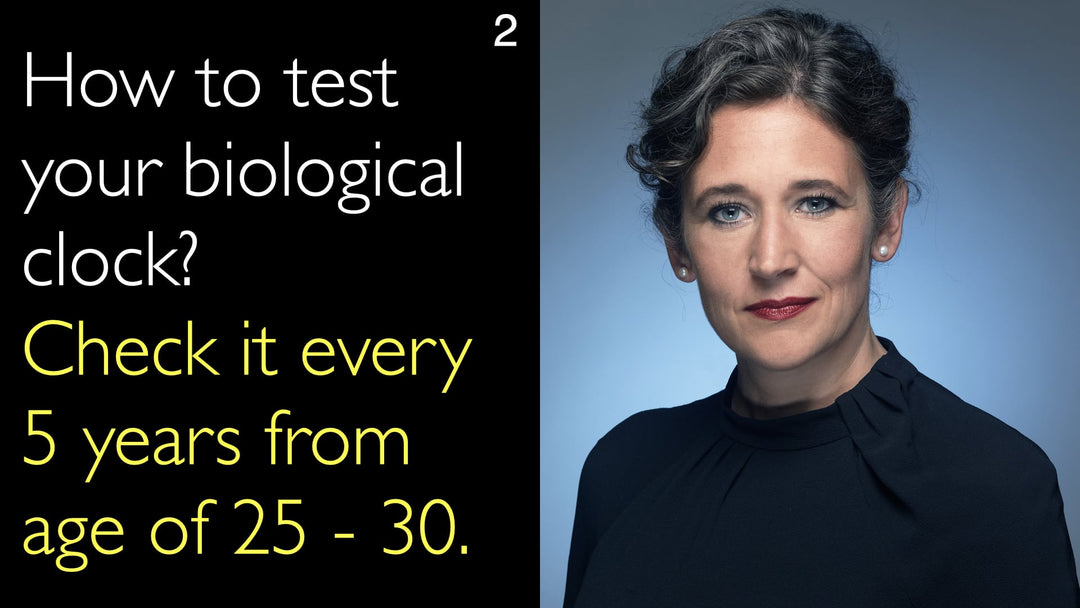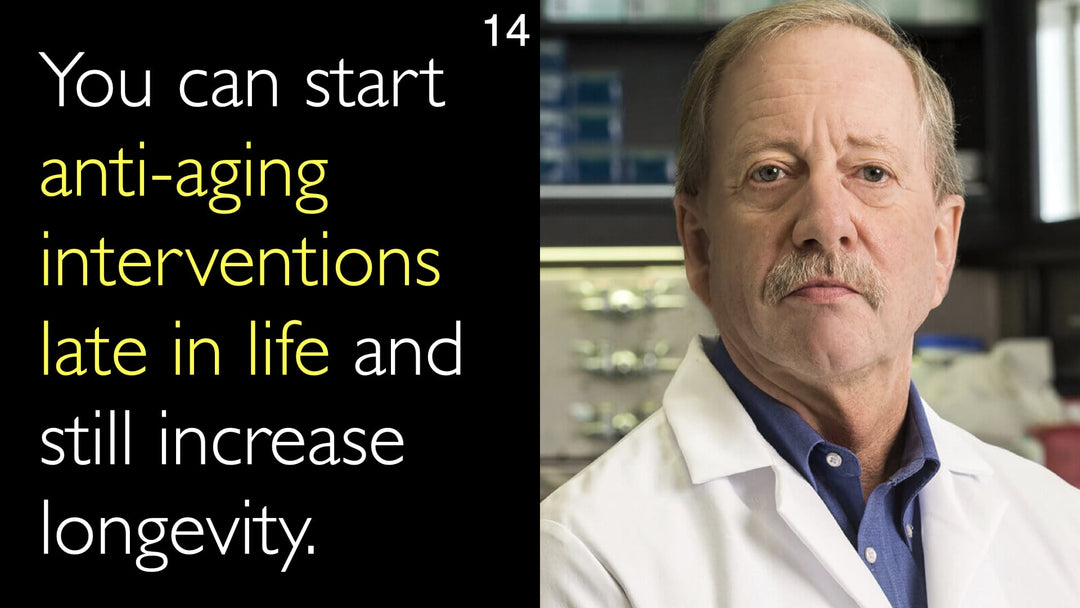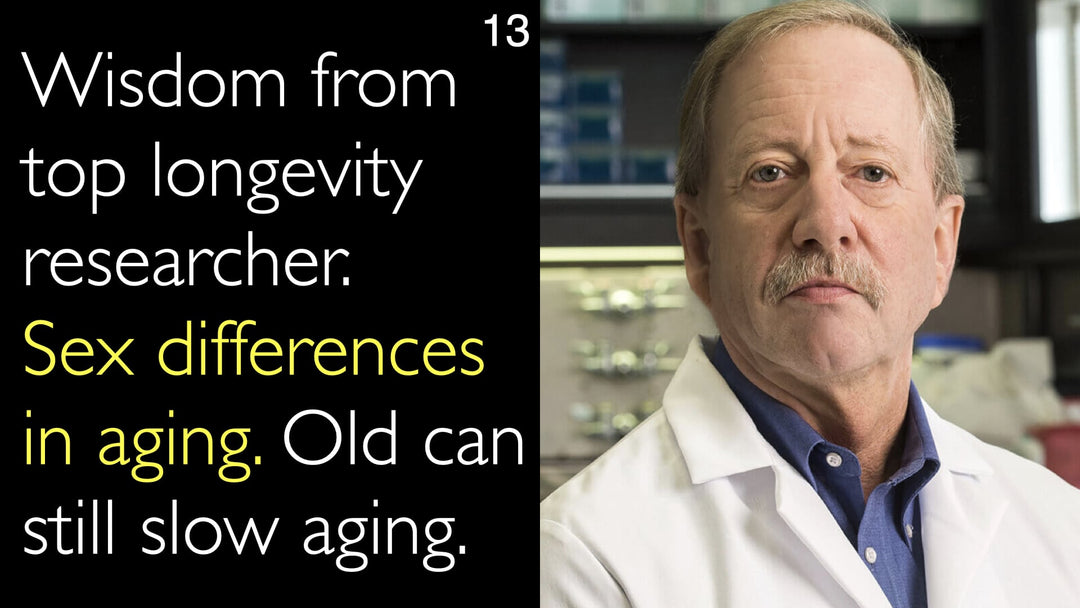Dr. Andrea Maier, MD, eine führende Expertin für Langlebigkeitsmedizin, erklärt, wie Sie Ihr biologisches Alter bestimmen können. Sie geht auf kommerzielle Tests ein, die Blutmarker und klinische Daten auswerten, um das biologische Alter zu ermitteln. Dr. Maier empfiehlt, solche Untersuchungen ab einem Alter von 25 bis 30 Jahren durchführen zu lassen. Aus Public-Health-Sicht rät sie zu einer Überprüfung alle fünf Jahre. Auch das regelmäßige Messen von Gewicht und Größe im Abstand von drei Monaten ist ein wertvolles Instrument zur Verfolgung der Gesundheit.
Biologisches Alter testen: Wann und wie Sie Ihre Gesundheitsuhr messen sollten
Direkt zum Abschnitt
- Verfügbarkeit von Tests des biologischen Alters
- Funktionsweise biologischer Uhren
- Zeitpunkt für den Beginn der Testung des biologischen Alters
- Empfohlene Testhäufigkeit
- Einfache Altersmarker für zu Hause
- Vollständiges Transkript
Verfügbarkeit von Tests des biologischen Alters
Tests zur Bestimmung des biologischen Alters sind weltweit über private Anbieter leicht zugänglich. Laut Dr. med. Andrea Maier handelt es sich dabei um ein kommerzielles Produkt. Patienten finden entsprechende Dienstleistungen einfach online. Die Tests analysieren Blutproben und andere klinische Daten und liefern anschließend einen Bericht, der Ihr biologisches mit Ihrem chronologischen Alter vergleicht.
Dr. Maier weist darauf hin, dass es sich um ein sich rasant entwickelndes medizinisches Feld handelt. Sie betont die Bedeutung, den Ausgangswert des biologischen Alters zu kennen – besonders vor Beginn gesundheitlicher Maßnahmen. Ziel ist es, dass Ihr biologisches Alter nach Lebensstilanpassungen sinkt.
Funktionsweise biologischer Uhren
Biologische Altersuhren werden auf Basis großer Bevölkerungsstudien entwickelt. Wie Dr. med. Andrea Maier erläutert, messen diese Uhren die Funktion zentraler Organsysteme – darunter klinische Bewertungen von Herz, Muskeln, Knochen und Gehirn. Anhand dieser Daten wird ein Gesamt-Biologicalter berechnet.
Diese Biomarker des Alterns liefern eine Momentaufnahme Ihres körperlichen Funktionszustands und damit ein genaueres Gesundheitsbild als das chronologische Alter allein. Im Gespräch mit Dr. med. Anton Titov hob Dr. Maier deren zunehmende Integration in die klinische Praxis hervor.
Zeitpunkt für den Beginn der Testung des biologischen Alters
Der ideale Zeitpunkt, um mit der Testung des biologischen Alters zu beginnen, liegt zwischen 25 und 30 Jahren. Dr. med. Andrea Maier erklärt, dass ab diesem Alter die Organfunktion allmählich nachlässt. Die Festlegung eines Ausgangswerts im jungen Erwachsenenalter ist für die langfristige Gesundheitsbeobachtung entscheidend.
Dieser proaktive Ansatz ermöglicht die frühzeitige Erkennung von beschleunigtem Altern und unterstützt informierte Lebensstilentscheidungen. Dr. Maiers Empfehlung bietet einen klaren Ausgangspunkt für präventive Gesundheitsmaßnahmen.
Empfohlene Testhäufigkeit
Aus Public-Health-Sicht empfiehlt Dr. med. Andrea Maier, das biologische Alter alle fünf Jahre überprüfen zu lassen. Diese Frequenz vereint Überwachungsbedarf mit gesellschaftlicher Erschwinglichkeit. Umfassende Bluttests sind bei stabiler Gesundheit nicht jährlich nötig.
Allerdings räumt Dr. Maier ein, dass interessierte Personen sich für häufigere Tests entscheiden können. Im Interview mit Dr. med. Anton Titov wurde diese Balance zwischen individuellem Interesse und Public-Health-Empfehlungen thematisiert. Das Fünf-Jahres-Intervall gilt als praktikable Richtlinie für die meisten Menschen.
Einfache Altersmarker für zu Hause
Wichtige Altersmarker lassen sich auch zu Hause ohne regelmäßige Bluttests verfolgen. Dr. med. Andrea Maier empfiehlt einfache Messungen wie Gewicht und Größe. Eine dreimonatige Kontrolle kann bereits signifikante Gesundheitstrends aufzeigen.
Gewichtszunahme gilt als relevanter Marker, der mit einem höheren biologischen Alter einhergeht und oft Lebensstiländerungen widerspiegelt, die die Langlebigkeit beeinflussen. Diese einfache Überwachung liefert wertvolle Daten zur Alterungsrate zwischen formalen Tests. Dr. Maier betont die Aussagekraft solcher grundlegender, regelmäßiger Beobachtungen für das Gesundheitsmanagement.
Vollständiges Transkript
Dr. med. Anton Titov: Gibt es bestimmte Tests, die weltweit in der Laborpraxis verfügbar sind? Kann man damit relativ einfach herausfinden, wie das biologische Alter einer Person ist? Gibt es Marker, die im Labor einfach oder relativ einfach zu ermitteln sind?
Dr. med. Andrea Maier: Absolut. Es gibt bereits verschiedene Uhren, die auf Basis großer Datensätze aus Studien entwickelt wurden. Wir haben klinische Uhren, mit denen wir die Funktion von Herz, Muskeln, Knochen und Gehirn messen können. Diese sind bereits verfügbar.
Man würde beispielsweise Blut abnehmen. Es gibt Unternehmen, die solche Tests anbieten und Ihnen dann Ihr biologisches Alter als Produkt zurückmelden. Das lässt sich sehr einfach online finden. Ich möchte kein bestimmtes hervorheben, da es ein sich entwickelndes Feld ist.
Doch es zeigt, dass bereits ein großer Markt existiert, weil Menschen ihr biologisches im Vergleich zum chronologischen Alter kennen möchten. Das ist sehr wichtig. Bevor man mit einer Intervention beginnt, sollte man sein biologisches Alter kennen und später prüfen, ob es nach der Maßnahme niedriger ist als das chronologische Alter.
Wir können diese Alterungstests also bereits von privaten Anbietern nutzen. Wer dafür bezahlen möchte, kann sie derzeit bereits anwenden. Es gibt viele Alterungsmarker und Altersuhren.
Fragen Sie auch bei Ihrem Haus- oder Facharzt nach, ob bereits Alterungsmarker eingesetzt werden. Einige Ärzte integrieren diese bereits in die klinische Versorgung.
Dr. med. Anton Titov: Sollte man einen Test des biologischen Alters einmal durchführen und dann vielleicht nach einigen Jahren wiederholen? Oder ist es sinnvoll, diese Tests regelmäßig zu machen? Wenn ja, wie oft sollten Alterungsmarker gemessen werden?
Dr. med. Andrea Maier: Das ist eine sehr gute Frage. Wenn Sie zehn verschiedene Ärzte für Langlebigkeitsmedizin fragen, werden Sie zehn verschiedene Antworten erhalten.
Meiner Meinung nach beginnt die Funktion der Organsysteme ab einem Alter von 25 bis 30 Jahren nachzulassen. Wir sollten die Funktion unseres Körpers im Auge behalten. Es gibt Wege, das biologische Alter zu messen. Ich sage nicht, dass wir das jährlich tun müssen.
Wenn alles gut läuft und Sie in Ihrer Funktion, etwa im kardiovaskulären System, nicht abbauen, sind Sie möglicherweise auf Kurs. Aber ich denke, eine Überprüfung der Alterungsrate alle fünf Jahre wäre aus Public-Health-Sicht das, was wir in die klinische Versorgung integrieren sollten.
Wie oft? Wir müssen bedenken, dass Medizin für die Gesellschaft erschwinglich sein muss. Wir wollen keine Tests einführen, die auf Public-Health-Ebene nicht notwendig sind.
Das heißt nicht, dass Personen, die an ihrem biologischen Alter interessiert sind, es nicht häufiger tun können. Ich habe es getan. Aber es gibt bereits viele Parameter der Alterungsrate, die einfach verfolgt werden können – zum Beispiel, indem man Gewicht und Größe misst und das mindestens alle drei Monate dokumentiert.
Notieren Sie das einfach und beobachten Sie die Entwicklung. Das ist bereits sehr wichtig, denn Gewichtszunahme steht in Zusammenhang mit einem höheren biologischen Alter und spiegelt oft Lebensstiländerungen wider.
Es gibt also einfache Möglichkeiten, das biologische Alter im Blick zu behalten, ohne alle drei Monate Blutproben zu nehmen.







